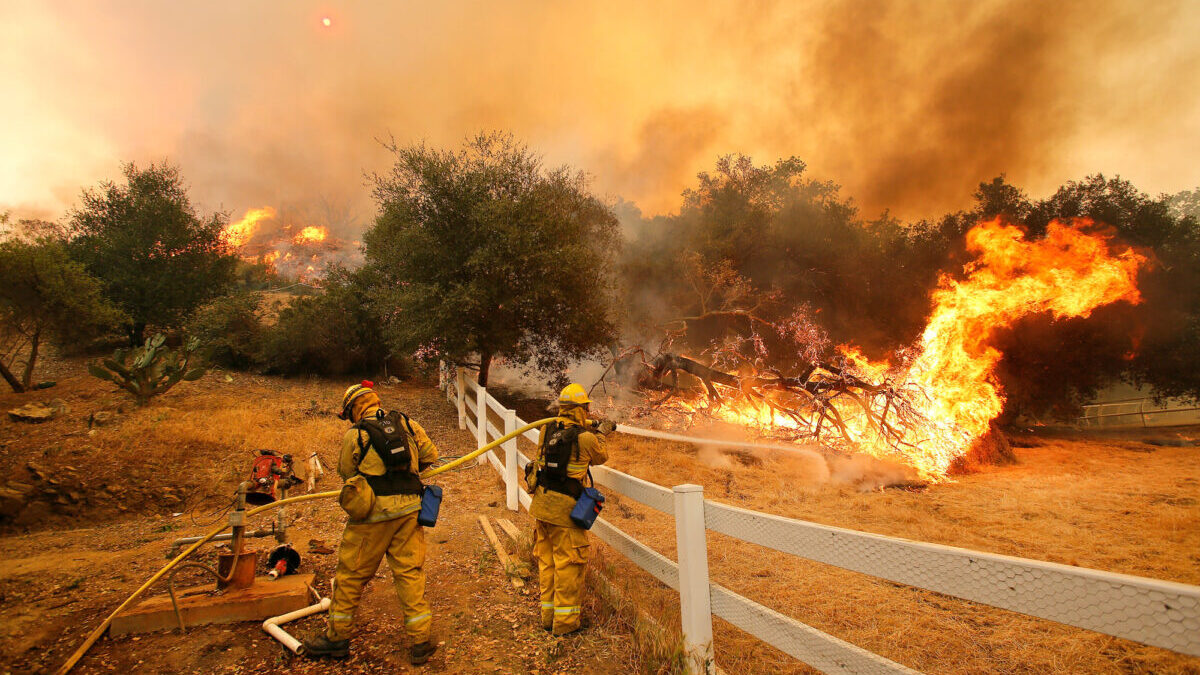Two of California’s largest insurance providers have ceased offering new coverage to property owners in the nation’s most populous state. Politicians, the press, and corporate spokesmen eager to protect their Wall Street “environmental, social, and governance” (ESG) scores are blaming climate change, but the true culprit is incompetent governance.
Allstate joined State Farm last week to discontinue applications for new property coverage in California, which has been ravaged by wildfires that have consumed entire communities. Last month, State Farm, which insures more property in California than any other company, declared a halt to new policies, citing “historic increases in construction costs” combined with “rapidly growing catastrophe exposure.” Allstate, California’s fourth-largest property and casualty insurance provider, quietly did the same, according to the San Francisco Chronicle on Thursday.
“The pause began last year but appeared to receive only a passing mention in industry publications,” the Chronicle reported. That Allstate and State Farm are ceasing coverage on the West Coast “signals that insurance woes in the state may be more severe than the public is aware of.”
The two insurance giants cover more than 13 percent of California’s property and casualty market share. Allstate told the Chronicle the firm paused new policies “so we can continue to protect current customers.”
Residents in fire-prone areas have already struggled to guarantee home insurance from companies wary of the potential wildfires that set the state ablaze every year. High-end insurers AIG and Chubb pulled back coverage in California last year, citing fire risk.
The depressed market has forced more homeowners to take advantage of the state-backed FAIR Plan, an “insurer of last resort” that usually costs more and covers only fire damage. FAIR Plan policies began to cover 3 percent of the market in 2021, up from just 1.6 percent in 2018.
Meanwhile, headlines covering the California insurance industry blame the property owners’ predicament on the existential “climate crisis.”
“Climate change is already making parts of America uninsurable,” Vox titled its coverage.
“Climate change is making California more expensive. Home insurance is the latest bellwether,” the Los Angeles Times headlined an editorial.
“Climate-fueled insurance crisis hits California,” read another headline in Politico.
But it’s not climate change powering the destruction of the insurance market. It’s poor public policy.
Wildfires Sparked by Bad Land Management
California’s annual devastation is preventable with proper land management. More than 100 years of fire suppression, however, has left forests in the American West overgrown, presenting nearby residents with massive tinderboxes ready to flare up into massive conflagrations that send smoke as far as Europe.
According to ProPublica, “Academics believe that between 4.4 million and 11.8 million acres burned each year in prehistoric California.” Between 1982 and 1998, however, state bureaucrats only burned an average of 30,000 acres a year. That number fell to 13,000 acres from 1999 to 2017.
Meanwhile, environmental prohibitions on roads and salvage logging in forested areas inhibit efforts to combat wildfires by hampering firefighters’ access to burning areas.
[READ: California Wildfire Devastation Was Entirely Preventable Through Proper Land Management]
Both state and federal officials are now years behind in California forest management, sending insurers fleeing. Democrat Gov. Gavin Newsom even cut the state’s budget for wildfire prevention and resource management by more than 40 percent.
State Law Is Punishing Providers
Myriad public policies are making it harder for insurance companies to operate economically in the fire-prone state. Not only are California blazes becoming harder to control from the buildup of fuels, but state law handicaps how insurers establish premiums.
A ballot measure passed in 1988 has led insurance companies to calculate rates based on the prior 20 years instead of forward-looking projections.
“Unable to account fully for wildfire risk, insurers instead have canceled or declined to renew policies in wildfire-prone areas,” E&E News reported. “In 2019, after two consecutive years of massive wildfires in California, the number of insurer cancellations or nonrenewals shot up to 235,000 from 165,000 in 2018, state figures show.”
State law also de facto caps how high companies can lift insurance premiums. When insurers try to lift rates beyond 7 percent, companies risk triggering a costly process wherein the increases are challenged. In the end, the companies lose out due to inflation cutting the real rate increase to 1 or 2 percent.
Four years ago, the California insurance commissioner amplified risk by temporarily barring insurers from dropping customers in areas hit by wildfires four years ago. The insurance commissioner also issued a directive for companies to increase discounts last year.
Labor Laws Threaten the Goats
Even California labor law will make it more difficult to sustain a healthy insurance industry, let alone healthy land. The Associated Press reported last week that regulations passed by the state legislature in 2016 will spike overtime pay for goat herders and threatens to put them out of business.
Targeted grazing, wherein livestock devours vegetation and thus clears out wildfire fuel, is a primary instrument of land management. Goats are able to reach steep terrain that is otherwise difficult to access, allowing goat herders to deploy an eco-friendly alternative to chemical herbicides for clearing.
But the new state labor regulations will treat goat herders under the same category as other farm workers.
“That would mean goatherders would be entitled to ever higher pay — up to $14,000 a month,” the AP reported. “Goat-herding companies say they can’t afford to pay herders that much. They would have to drastically raise their rates, which would make it unaffordable to provide goat grazing services.”
Fewer goats mean fewer animals to clear out overgrown vegetation, leading to even larger fires, more destruction, and higher insurance costs.
Media, lawmakers, and corporate America can blame the so-called climate crisis all they want, but it’s clear the real offenders in California’s insurance disaster are those mismanaging the state.









